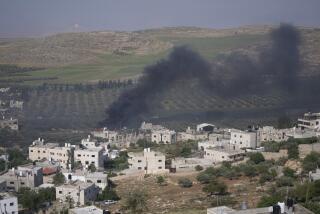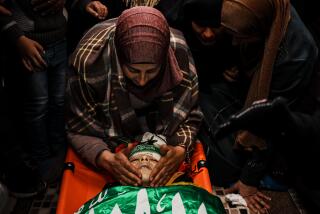In Anbar, Sunni rivalries surface
Hadi Hussein, a Sunni fighter working with U.S. and Iraqi forces, was receiving well-wishers Sunday when his 18-year-old cousin walked up with a box of chocolates. The teenager offered a candy, but didn’t wait for a response. He detonated hidden explosives, killing himself, Hussein and four others.
“This is life, we have two brothers, one is good, one is bad in the same family,” said Aftan Sadoun Aftan, the head of Hussein’s Sunni Arab paramilitary unit in the village of Ameriyat Fallouja in Anbar province.
Hussein had just been freed by the Americans after being wrongly detained for a week, said Aftan, who left the party a few minutes before the blast. About 20 clansmen were drinking juice and eating candies when the teen, Ali Abdullah Hussein, set off his explosives.
The bloodshed Sunday, one day after two suicide bombers killed a pair of policemen in nearby Ramadi, was a reminder of how complicated the dynamics remain in Anbar, where the violence is not just strictly a matter of tribesmen rising up against Islamic radicals.
After turbulent years that saw the province turned into a base for hardened Sunni militants, the clashes now stem as much from conflicts within families or between rival clans as various factions seek to assert dominance in an area.
Aftan described what’s happening in Ameriyat Fallouja as a battle between tribesmen who decided to stay aligned with the militant group Al Qaeda in Iraq and those who joined the paramilitary units to help U.S. and Iraqi troops drive out the radical Islamic movement.
Asked why one member of his Albu Issa tribe would kill another, Aftan compared it to school shootings that happen in the United States.
“It’s the same reason the American went inside the school and killed his fellow citizens. Some people have deviant beliefs,” Aftan said.
Just hours after Sunday’s bombing, a woman from his tribe wearing an explosives belt tried to blow herself up at Aftan’s office, but his guards stopped her outside. Aftan explained she was seeking vengeance.
“Her husband was a dog of dogs from Al Qaeda, and she wanted revenge for him,” he said. “Six months ago, he was using a heavy machine gun and U.S. warplanes struck him.”
Aftan said it was only in November that his paramilitary group, one of the so-called Awakening Councils that back U.S. and Iraqi forces, won the battle in full for Ameriyat Fallouja.
Sunni tribesmen in Anbar first rallied to drive out Al Qaeda in Iraq in late 2006. Since then, their example has inspired similar efforts around the country.
But observers caution the fighting can sometimes involve power struggles within a clan or between tribes.
The International Organization for Migration has tracked internal displacement in Anbar and noted after interviews with those who have fled the violence that the fights often have a tribal component. After one of the first tribal leaders to ally himself with the U.S., Anbar Salvation Council founder Sheik Abdul-Sattar abu Risha, was killed in September in a bomb attack, 700 Sunni families fled cities across Anbar fearing an arrest campaign, the organization reported.
“Especially with the Awakening Councils now, some tribes get more power over others, because they are supplied with weapons and financing,” said Dana Graber-Ladek, an Iraq specialist with the International Organization for Migration.
“It’s a power struggle,” Graber-Ladek said. “It’s a struggle for land and resources, the goodwill of the people and other local leaders.”
In west Baghdad’s Amiriya district, a failed assassination attempt in October on the area’s local Sunni paramilitary leader, Abu Abed, was traced to a rival tribe’s wish to replace him as the head of his organization, according to U.S. military officers. The rival clan had formerly been linked to Al Qaeda in Iraq.
A U.S. spokesman in Baghdad told reporters Sunday that many Iraqis had joined Al Qaeda in Iraq because they had few options, and noted that some had now crossed over to fight the movement.
“Some had little choice as the insurgency destroyed the economy and pride drove their allegiance to Al Qaeda in order to put food on their family’s table,” said Rear Adm. Greg Smith.
He added that the Islamic extremists had lost influence in the last year thanks in part to the rise of the Sunni paramilitary groups, such as those in Anbar, that now back the Iraqi government.
Smith said Iraqi and U.S. forces had killed 121 suspected militants since Jan. 8, when they launched a nationwide offensive against Sunni militants. But he warned that the insurgents could still cause damage.
“We know that this remains a tough fight, and one that has had, and will continue to have, dark and difficult days and weeks,” Smith said.
He also said that a rise early this month in the number of attacks using armor-piercing bombs had proved short-lived. The military alleges that the bombs, called explosively formed penetrators, or EFPs, used by Shiite militias come from Iran. Such bomb attacks had dropped significantly since the fall.
“The number of signature weapons that had come from Iran and had been used against coalition and Iraqi forces are down dramatically except for this short uptick in the EFPs in the early part of January,” Smith said.
He said that Saudi nationals continue to account for nearly 50% of all foreign fighters, but added that the Saudi and Syrian governments had taken steps to stem the flow of militants into Iraq. Al Qaeda in Iraq still has fighters concentrated in pockets of Anbar and Diyala provinces, and in areas around the northern provinces of Tamim and Salahuddin as well as the city of Mosul and the area southeast of Baghdad, Smith said.
The U.S. military also said in a statement that it had dropped 19,000 pounds of explosives on the farmland of Arab Jabour south of Baghdad. The strikes targeted buried bombs and weapons caches.
In the last 10 days, the military has dropped nearly 100,000 pounds of explosives on the area, which has been a gateway for Sunni militants into Baghdad.
Special correspondents in Anbar province contributed to this report.
More to Read
Start your day right
Sign up for Essential California for news, features and recommendations from the L.A. Times and beyond in your inbox six days a week.
You may occasionally receive promotional content from the Los Angeles Times.






